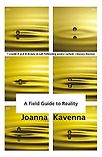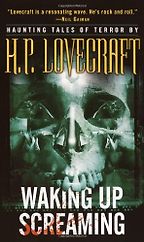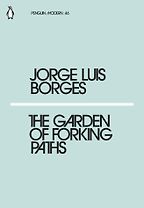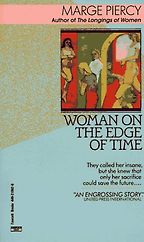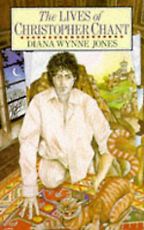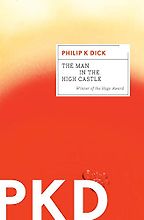Your first book?
I’ll start with H.P. Lovecraft, who thinks reality itself is completely nuts, and that anyone who thinks there is a single absolute or straightforward interpretation of our reality is obviously barking mad. “Beyond the Wall of Sleep” is a story about Slater, a “white trash vagrant” who falls into this psychotic rage and murders his neighbour. When the narrator meets him in an asylum, Slater keeps having these bizarre visions of amazing things with green lights, and oceans of space and beautiful music, and mountains and valleys, and also of this blazing entity that has it in for him. Obviously the narrator thinks: how can this illiterate idiot have these extraordinary visions, where did they come from? The narrator attaches a telepathic device to Slater so that he can experience it as well, whereupon conveniently Slater dies, and this voice starts communicating to the narrator and says: I come from this world that you enter in your freedom of sleep – once you enter your dreams you lose all the trappings of your tedious reality and enter this wonderland. He says in sleep we all roam through many ages and lose all the limits of time and space.
The narrator has to be regarded as having had a nervous breakdown, and Lovecraft is using dreams as a way in, to justify it all, but really every time the story takes fire and leaps at you it’s because of these descriptions of this extraordinary place.
The Lovecraft stories that I really love are these ones that some people call the Dreamland Cycle (this story is often classified as one of them) about worlds that you enter through dreams. But even within these worlds, people say: don’t push too much against the boundaries of what you’re permitted to see, so there’s still that sense of prohibition. You have to be absolutely certain you can cope; so it’s always about how much disillusion of your sense of reality can you deal with in these worlds? How far can you go before you say: actually I’d quite like things to be normal? In the end we don’t like to lose our entire identity and humanity.
What happens in The Garden of Forking Paths?
Ostensibly it’s set in the Second World War but as Borges always does, he creates this world of bizarre, really occult coincidences that are completely unbelievable, unless you’re in Borges’s world. It takes the form of a signed statement narrated by a Chinese spy living in Britain during the First World War. He has an ancestor, Ts’ui Pen, who worked for years on what was later called a completely pointless enterprise: to write a huge novel and create a labyrinth. The labyrinth was never found, and the novel was regarded as totally contradictory and meaningless – in one chapter the hero’s dead, in another he’s alive – so it appeared during his lifetime that this guy was a complete failure. The spy finds out that what Ts’ui Pen was trying to do wasn’t creating a labyrinth as a physical object: what he wanted to do was to create a book which embraced all possibilities that exist in time, and in which all possibilities were realised for the spy character. The spy is told: it’s not just in this guy’s literary imagination; we’re in just one of many worlds.
Five Books interviews are expensive to produce. If you're enjoying this interview, please support us by donating a small amount.
The reason why this story’s so fascinating is because it’s always said that it predates Everett’s many-worlds theory by about 15 years – it was written in 1941, and really Everett is advancing his theory in the mid 1950s, but it’s not until the 60s and 70s that it’s becoming discussed within the scientific mainstream. So you get this classic example – as you do with HG Wells – of someone who’s philosophically incredibly brilliant, as Borges obviously is, and manages to predate what is then classified as scientific theory simply by thinking about the universe in an interesting way. Really that was all that Everett was doing – because many-worlds theory is again about all the forkings that occur at a particular moment in time.
Getting to a quantum truth via creative thinking?
Exactly, but Borges is showing that these quantum “truths” are in themselves just imaginative – they’re not really any closer to truth than Borges himself. Science – Michio Kaku and so on – didn’t start this debate: literature has been doing this for centuries, talking about parallel worlds. Don’t come in in the last decades of the 20th century and think you’ve invented it all.
And the Marge Piercy?
It’s about a 37-year-old called Connie Ramos who starts communicating with a character from the (or a) future called Luciente. Luciente comes to Connie’s present but then takes Connie to her future, where people live in rural communities, make all their own food, bring up their children communally and have polyamorous relationships and a tribal identity. Connie gets put in an asylum, not because of these visions, but because she gets in a fight – she’s from this very poor underworld – and her visions of the future become related to what’s happening to her in the asylum. There’s this treatment they’re testing out in the asylum where they insert a device into the patient’s brain to control their emotions by flicking a switch. At the point Connie is operated on she goes into a completely different future. Once her present becomes unbearable, the future itself becomes equally horrific and she projects into this other future where humans are used for organ harvests and the rich live to 200 and the “duds” die early. This future’s malevolently technocratic, and the apotheosis of controlling technology. Connie realises that her time is the point at which these two futures are being arbitrated.
What’s really brilliant about this novel is that it could obviously all be in her head, about the way we create our own realities and how our sense of reality is totally determined by our own mental states. But it could be that Piercy is saying that this is possible – it is true that through the actions of a particular time, different futures occur.
Christopher Chant?
There is so much children’s fiction that is described as parallel worlds fiction – from Narnia to Alice in Wonderland to Marianne Dreams and so on. Diana Wynne Jones is a brilliant writer of this sort of book: it’s about a schoolboy who discovers that in his dreams he travels to many worlds. He’s quite innocent about it all and sees it as a child would – as an amazing experience that he doesn’t particularly try to analyse. His uncle asks him to do some experiments and sends him into these worlds with a spirit traveller called Tacroy, and tries to get him to bring stuff back. Christopher thinks his childhood fantasies have been recognised by an exciting adult, but the reality is that his uncle’s just trading the stuff on the black market. The point is, though, that Christopher experiences these parallel worlds incredibly vividly and physically, and they’re tangible; whereas Tacroy, perhaps because he’s an adult and not in tune, only really sees them as a mist. Again it’s about who has access to these worlds and what they take with them; how the reasons why they get there define what happens when they get there. Tacroy envies Christopher’s access, but equally Christopher’s access is far less informed – he doesn’t understand what’s going on at first.
I suppose the reason parallel worlds fiction appeals to children is because the child is a bit like a lunatic in some way – they don’t stand within these ordinary worlds’ orthodoxies and they haven’t yet been socialised or told the ways in which they have to direct their thoughts and censor their personalities.
And the Philip Dick?
It’s set in 1962, in a parallel reality in which Roosevelt was assassinated in 1933, so the whole of the Second World War was completely different and lasted until 1948 with the US forced to surrender. America is ruled by the Germans and Japanese, and it’s all about what people end up doing in this reality. There’s all these different people masquerading, and specialising in the trade of fakes; the whole of reality has collapsed, and nothing can be trusted as real. There’s a novel within the novel, called “The Grasshopper Lies Heavy”, by a character called Abendsen who lives alone in a castle, which is set in another reality again – not ours – in which the Axis lost the Second World War, but the war lasted 1939-1948. The climax of this novel, which is brilliant, is that a woman finds Abendsen and says what does your novel mean? She also asks the I Ching, and the I Ching symbol is “inner truth”: so it’s a suggestion that they’re living in yet another reality while a whole load of others are going on – that of The Grasshopper Lies Heavy is happening in another place, and there’s probably another reality that we’re in. You think you’ve acquired one truth: but that truth is really that there are infinite truths and infinite worlds, and nobody knows what the hell is going on, basically.
So reality is an inchoate force that everyone makes his or her own shape out of?
Exactly, and attempts to order it are always a bit suspicious.
November 26, 2009. Updated: September 3, 2024
Five Books aims to keep its book recommendations and interviews up to date. If you are the interviewee and would like to update your choice of books (or even just what you say about them) please email us at [email protected]

